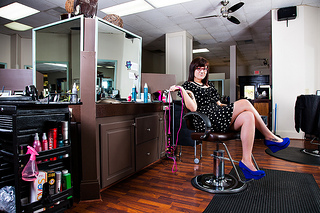When you’re on the market for the perfect-fit beauty school, it can be a little daunting. A lot of factors to think about could very seriously effect this giant decision that you are facing. The biggest problem is that you might not necessarily know the right questions to ask to get at the information you need. But don’t worry; help is on the way! Here’s a good primer on some of the most important questions you can ask/consider when looking into beauty school.
Accreditation: is the school accredited? Schools that are accredited have passed specific academic and institutional requirements. These requirements are set by the accrediting organization and are based on factors like curriculum, facilities, staff, admissions policies, and quality of instructors. It is always the school’s choice whether or not to become accredited, but one very large factor in this decision is that accreditation is required by the US Department of Education in order to become eligible to offer government funding to students.
Speaking of funding: is there any kind of financial assistance available to you? Cosmetology school can be a pricey endeavor and without the proper financial base, it can be nearly impossible. If no assistance is available (or even if it is), what are your payment options? Remember that a school’s reaction to their students’ financial questions can demonstrate the school’s focus on and relationship with their students.
What is the difference between hair school, cosmetology school, beauty school, a beauty institute, barber school, or some kind of beauty “college” or “academy”? Not much of anything, but sometimes something. In terms of “academy”, “school”, or “college”, this has a lot to do with how the organization chooses to brand itself. What’s really important is the programming the school offers rather than the words they use to describe themselves. That said, there can be differences between “beauty school”, “hair school”, and “barber school”. Barber schools, as the name suggests, are specifically oriented towards students who are looking to become licensed barbers. Beauty and hair schools often offer cosmetology programs in addition to hair-specific services. The bottom line is: look at the training that the institution offers and make a decision based upon that.
What programs can I expect to see at a beauty institute? Every school has a different course of study, but there are several common tracks. Some of these include: Esthetics (the study of applying make-up and performing skin care regimes such as facials and waxing; often massage and reflexology are also included), Electrolysis (permanent hair removal via laser for the body and face), Nail Technology (the study of nail design and the creation of nail art), and Teacher Training (a program offered with an eye towards training cosmetology teachers).
What techniques will I be taught, and is there any kind of “return policy” in case I need a brush-up, or new technology/styles emerge? Fashion and personal style are fields which change very quickly. How is the beauty school going to prepare you to keep up with the latest trends in hair, nails, make-up, etc.? Will they allow you to return to take a “brush-up” class in case something drastic happens in the field after you graduate?
What kind of clients will I be serving? Yes, you will cut real hair when you are in hair school. You want to make sure that you have a wide array of experience before you graduate to ensure that you have the most diverse body of knowledge possible. Where does the school get its volunteers and how broad is that base? (This will also have to do with where the school is situated geographically).
Location, location, location. Where is the beauty school? Is it somewhere you actually want to live? Atlanta, GA is a different place from New York City; it’s important to think about the lifestyle you want during beauty school and how the school’s location will influence and affect that lifestyle. Is it close to or far from home? How will this impact your daily routine/relationship with loved ones?
What are the other students like? Remember; these are people you’re going to be spending a lot of time with over the next few years. It would be helpful to know the kind of demographic that the school draws just to make sure that it’s a good fit for you.

Leave a Reply